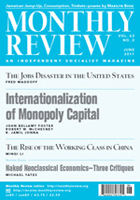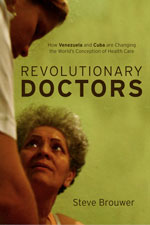Cuban Urban Agriculture as a Strategy for Food Sovereignty
Celia Sánchez and the Cuban Revolution
Nothing makes me more hopeful than discovering another human being to admire. My wonder at the life of Celia Sánchez, a revolutionary Cuban woman virtually unknown to Americans, has left me almost speechless. In hindsight, loving and admiring her was bound to happen, once I knew her story. Like Frida Kahlo, Zora Neale Hurston, Rosa Luxemburg, Agnes Smedley, Fannie Lou Hamer, Josephine Baker, Harriet Tubman, or Aung San Suu Kyi, Celia Sánchez was that extraordinary expression of life that can, every so often, give humanity a very good name.… | more |
His right eye blinked furiously, swollen and red; he continued to rub it…. Louis-Jodel Chamblain, the man sitting across from me, had been a commander of the paramilitary force…known as the Revolutionary Front for the Liberation of Haiti—also known as the Front for the National Liberation and Reconstruction of Haiti, or FLRN…. He was also a cofounder in the mid–1990s of the Front for the Advancement and Progress of Haiti (FRAPH) death squads. According to Human Rights Watch, the FRAPH took part in the killing of at least 4,000 people as well as in thousands of rapes and other acts of torture. Before cofounding the FRAPH, Chamblain had served with the Tonton Macoutes, the infamous paramilitary arm of the Duvalier dictatorship, which according to human rights organizations was responsible for killing tens of thousands of people and victimizing many more.… | more |
Cuba is remaking medicine in a remarkable diversity of cultures in Latin America, the Caribbean, Africa, Asia, and the Pacific Islands. Its efforts go far beyond providing medical care to other parts of the world as a Western approach might limit itself to doing. The Cuban project develops bilateral agreements with host countries to rethink, redesign, and recreate medicine.… | more |
For the past three decades Howard Waitzkin has been (along with Vicente Navarro) the leading social medicine theorist in the United States. Medicine and Public Health at the End of Empire provides a superb sampling of Waitzkin’s wide-ranging work, and a readily accessible introduction to the searching insights offered by a Marxist view of medicine.… | more |
How the CIA Got Away With Murder
Ratner and Smith have done it again! Who Killed Che? How the CIA Got Away With Murder is their second bombshell book dealing with Che Guevara and the U.S. government’s frequent use of illegal and criminal political assassinations and routine whopper lies in its foreign policy, all in the name of “defending freedom”…. In their new Che book these two prominent civil liberties lawyers present forty-four previously classified documents released under the Freedom of Information Act to show—quite meticulously and colorfully, as if in a courtroom drama—how the CIA, in concert with the White House, masterminded the murder of Che and then tried to cover it up.… For some readers this may seem like an old story, since the U.S. government now openly proclaims the legitimacy of assassinating foreign leaders and even U.S. citizens during its hypocritical “war on terrorism.”… But as Che himself once said in words that Libya’s murdered leader Muammar Qaddafi might have done well to heed, “You cannot trust imperialism, not even a little bit, not in anything.” And there, indeed, is the rub.… | more |
The Paradox of Cuban Agriculture
When Cuba faced the shock of lost trade relations with the Soviet Bloc in the early 1990s, food production initially collapsed due to the loss of imported fertilizers, pesticides, tractors, parts, and petroleum. The situation was so bad that Cuba posted the worst growth in per capita food production in all of Latin America and the Caribbean. But the island rapidly re-oriented its agriculture to depend less on imported synthetic chemical inputs, and became a world-class case of ecological agriculture. This was such a successful turnaround that Cuba rebounded to show the best food production performance in Latin America and the Caribbean over the following period, a remarkable annual growth rate of 4.2 percent per capita from 1996 through 2005, a period in which the regional average was 0 percent.… | more |
Do the United States and Mexico Really Want the Drug War To Succeed?
Until late in the twentieth century heroin and cocaine addiction in Mexico was not considered a major problem…. [But today] both the governments of Mexico and the United States have demonstrated a need to justify military actions and to portray the “War on Drugs” as a battle between good and evil with no gray areas in between. To make the rhetoric effective it has been necessary to villainize the perpetrators of the “evil” and to ignore the dominant reasons that the evil exists: unabated drug consumption in the United States…. As long as the assassinations, beheadings, cateos, and the majority of the corruption of government official remain south of the border the United States can maintain its pro-military stance, send money and arms to Mexico’s conservative government, and focus on more demanding issues. Mexico, in contrast, rejecting any form of legalization, remains bound to its U.S.-appeasing commitment to continue a bloody confrontation that seems to have no end.… | more |
Cuba has found oil in its part of the Gulf of Mexico and is about to start drilling. Even if the results are moderate, Cuba will become energy independent and eventually a net exporter. This will have an incalculable impact on its economy, and will send the U.S. sanctions policy into the dustbin of imperial miscalculations. This has brought out Miami’s congressional assault team led by the fanatical Representative Ileana Ros-Lehtinen, who essentially wants to criminalize drilling in Cuba’s section of the Gulf. But caught between a commitment to maintaining the embargo and an understanding of the necessity of Cuba cooperation lest there be another BP-style disaster, the Obama administration has remained largely passive. Will Cuban oil help change the balance of power in the Americas in the near future?… | more |

June 2011, Volume 63, Number 2
Manning Marable, who died last April 1, aged sixty, was the quintessential radical academic/activist. A friend of Monthly Review for many years, he wrote numerous articles for the magazine and chapters for Monthly Review Press books. Manning was a committed Marxist and socialist. He unflinchingly engaged with issues of race and class, most recently working with younger artists of color organizing for social change as a founder of the Hip Hop Summit Action Network.… In MR‘s July-August 1995 issue Marable posed this challenge: “Americans continue to perceive social reality in a manner which grossly underestimates the role of social class, and legitimates the categories of race as central to the ways in which privilege and authority are organized. We must provide the basis for a progressive alternative to an interpretation of race relations, moving the political culture of black United States from a racialized discourse and analysis to a critique of inequality which has the capacity and potential to speak to the majority of American people. This leap for theory and social analysis must be made if black United States is to have any hope for transcending its current impasse of powerlessness and systemic inequality.”… | more |
Marilyn Buck (1947-2010) spent over twenty-five years in prison for politically motivated actions against U.S. government policies and in support of the Black Panthers and the Black Liberation Army. She wrote these poems behind bars, as a way to comprehend the reality of prison and continue her fight as a white woman against injustice, particularly U.S.-generated white supremacy. Paroled in July 2010, she died of cancer twenty days after her release.… | more |

How Venezuela and Cuba Are Changing the World’s Conception of Health Care
Revolutionary Doctors gives readers a first-hand account of Venezuela’s innovative and inspiring program of community healthcare, designed to serve—and largely carried out by—the poor themselves. Drawing on long-term participant observations as well as in-depth research, Brouwer tells the story of Venezuela’s Integral Community Medicine program, in which doctor-teachers move into the countryside and poor urban areas to recruit and train doctors from among peasants and workers. Such programs were first developed in Cuba, and Cuban medical personnel play a key role in Venezuela today as advisors and organizers. This internationalist model has been a great success—Cuba is a world leader in medicine and medical training—and Brouwer shows how the Venezuelans are now, with the aid of their Cuban counterparts, following suit.… | more |

An Anthology
José Carlos Mariátegui is one of Latin America’s most profound but overlooked thinkers. A self-taught journalist, social scientist, and activist from Peru, he was the first to emphasize that those fighting for the revolutionary transformation of society must adapt classical Marxist theory to the particular conditions of Latin American. He also stressed that indigenous peoples must take an active, if not leading, role in any revolutionary struggle.… | more |
The Latin American School of Medicine Today
ELAM
A revolution can only be successful when the new generation takes over from the old. When thousands of students come together because of their dedication to helping others at a school that was built to allow them to fulfill their goals, the ground is fertile for students to continue the struggle.… Students are assuming defining roles at the Latin American School of Medicine (Escuela Latinoamericana de Medicina or ELAM), the twelve-year-old medical school in Santa Fe, Playa, a ninety-minute bus ride from Havana, Cuba. With their educational costs covered by the Cuban government, students learn new social relationships in medical practice that they will use in underserved communities in their countries.… | more |
States of Exception—Haiti’s IDP Camps
According to the Italian philosopher Giorgio Agamben, camps—for example, concentration camps, refugee camps, and internally displaced persons (IDP) camps—risk replacing nation-states as the most representative political spaces of our time. Agamben’s definition of “the camp” includes extra-judicial detention centers such as Guantánamo Bay; airport hotels that hold would-be immigrants awaiting deportation; the marginalized, segregated outskirts of Europe’s large cities; and even gated communities in the United States, with their private security firms and individualized “laws” that govern entry and exit. What all these spaces share is the suspension of national, territorial law and its replacement by police power. Those who reside in these legal dead zones are no longer “citizens”; they live in a state of exception to the law of the land—“exceptions” that are becoming more and more the rule.… Haiti’s IDP camps are indeed “states of exception” that risk becoming permanent fixtures in the post-earthquake urban landscape in and around Port-au-Prince.… | more |
Anarcho Grow Pura Vida in Costa Rica is a modern story that carefully blends author T.A. Sedlak’s knowledge of Costa Rica and cannabis cultivation with socialist ideals in an American capitalist dominated world.… Protagonist Ben Starosta travels through Latin America under the guise of teaching English while helping small agrarian communities develop illicit crops and reach new markets. His expertise in the risky cannabis trade funds community projects like schools and libraries, and earns him the loyalty of the communities he helps. Tension builds, as his dedication to the people is viewed as dangerous criminal activity by the CIA agents assigned to his case.… | more |
ALBA and the Promise of Cooperative Development
Existing international economic institutions and relations operate in ways detrimental to third world development. That is why eight Latin American and Caribbean countries—led by Venezuela, Cuba, and Bolivia—are working to build the Bolivarian Alliance for the Americas (ALBA), a regional initiative designed to promote new, nonmarket-shaped structures and patterns of economic cooperation.… In response to worsening international economic conditions, ALBA has recently stepped up efforts to promote a full-blown regional development process.… Although the precise terms of the agreement are still to be negotiated, official statements point to the creation of an integrated trade and monetary zone, with a new regionally created currency, the sucre.… | more |
In the eyes of much of the world, the year 1989 has come to stand for the fall of the Berlin Wall, the demise of Soviet-type societies, and the defeat of twentieth-century socialism. However, 1989 for many others, particularly in Spanish-speaking countries, is also associated with the beginning of the Latin American revolt against neoliberal shock therapy and the emergence in the years that followed of a “socialism for the 21st century.” This revolutionary turning point in Latin American (and world) history is known as the Caracazo or Sacudón (heavy riot), which erupted in Caracas, Venezuela on February 27, 1989, and quickly became “by far the most massive and severely repressed riot in the history of Latin America.”… | more |
Latin America & Twenty-First Century Socialism: Inventing to Avoid Mistakes
Twenty years ago, left forces in Latin America and in the world in general were going through a difficult period. The Berlin Wall had fallen; the Soviet Union hurtled into an abyss and disappeared completely by the end of 1991. Deprived of the rearguard it needed, the Sandinista Revolution was defeated at the polls in February 1990, and Central American guerrilla movements were forced to demobilize. The only country that kept the banners of revolution flying was Cuba, although all the omens said that its days were numbered. Given that situation, it was difficult to imagine that twenty years later, left-wing leaders would govern most of the Latin American countries.… | more |



































The Trial: The Untold Story of the Cuban 5
The Trial is a Documentary by Rolando Almirante, narrated by Danny Glover and presented by ICAIC and Telesur. You can view the entire documentary below and read articles by Ricardo Alarcón de Quesada about the Cuban 5.… | more |